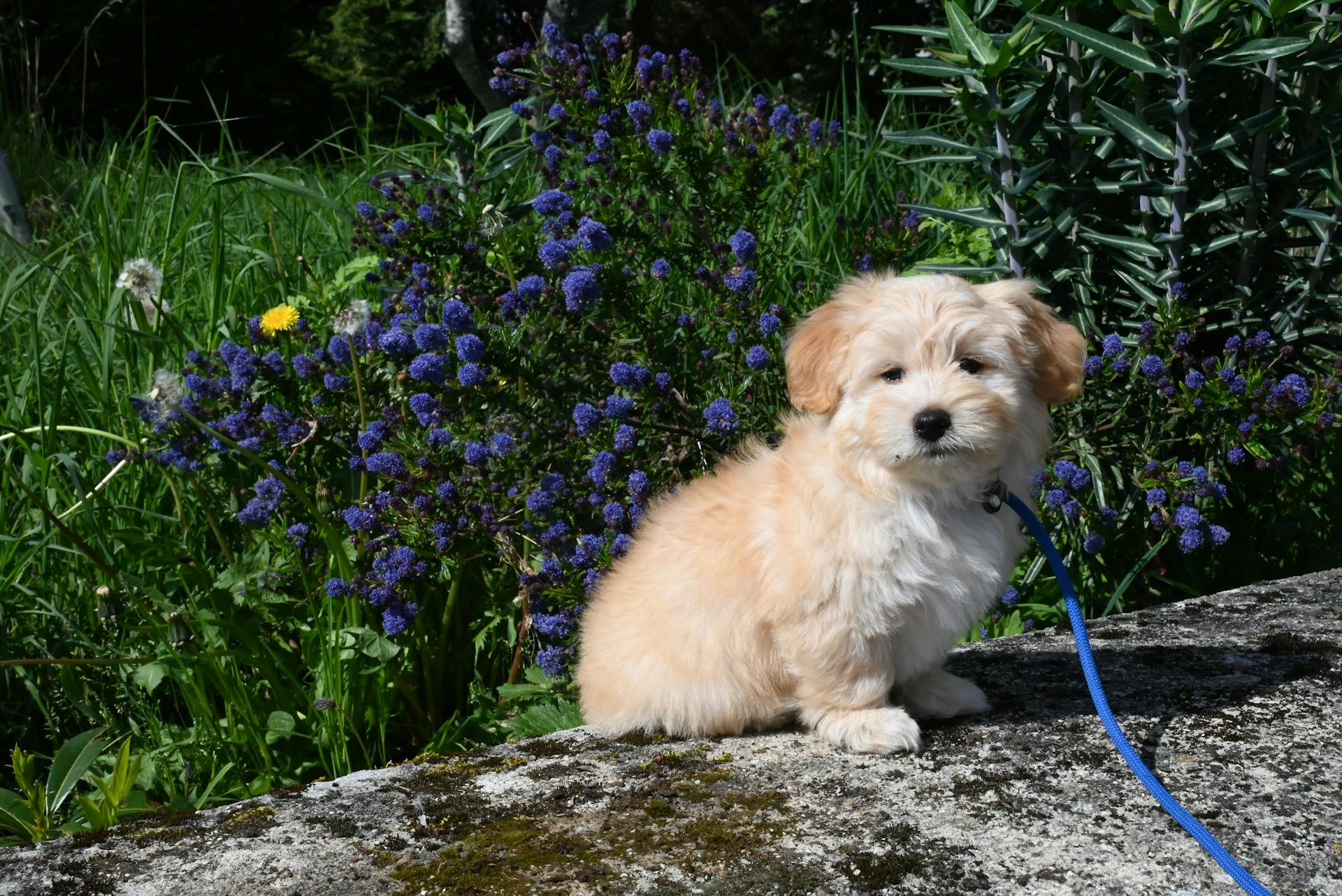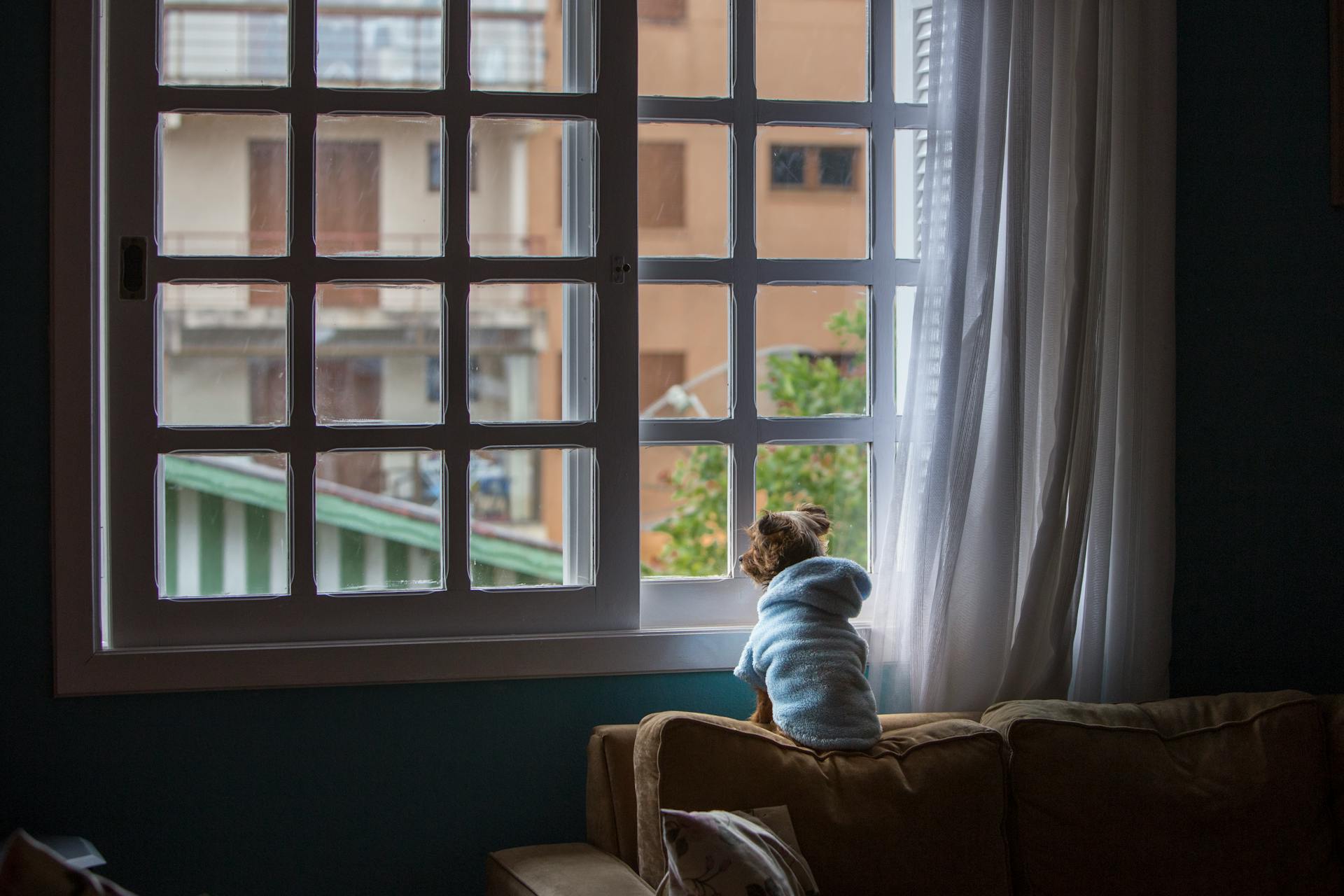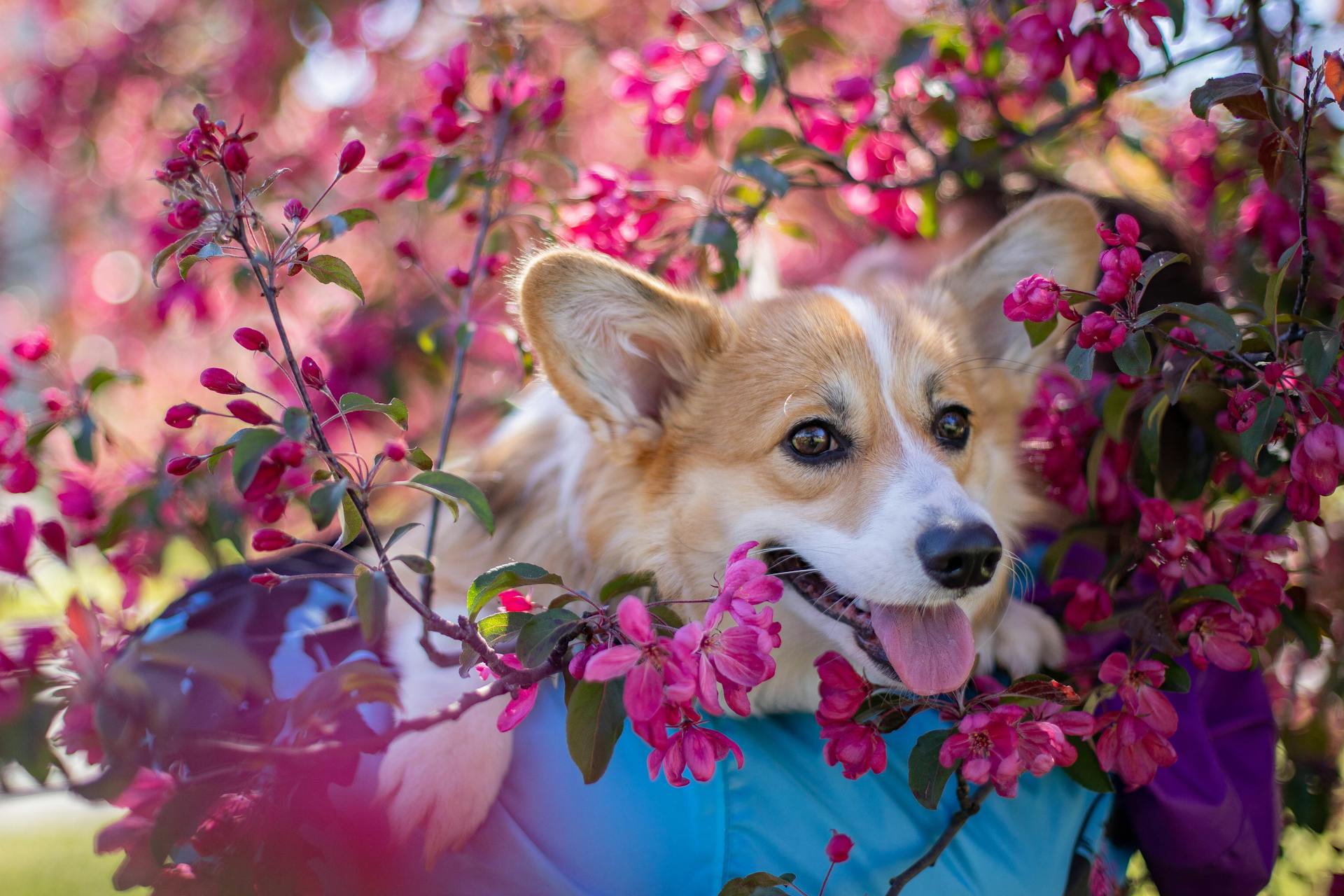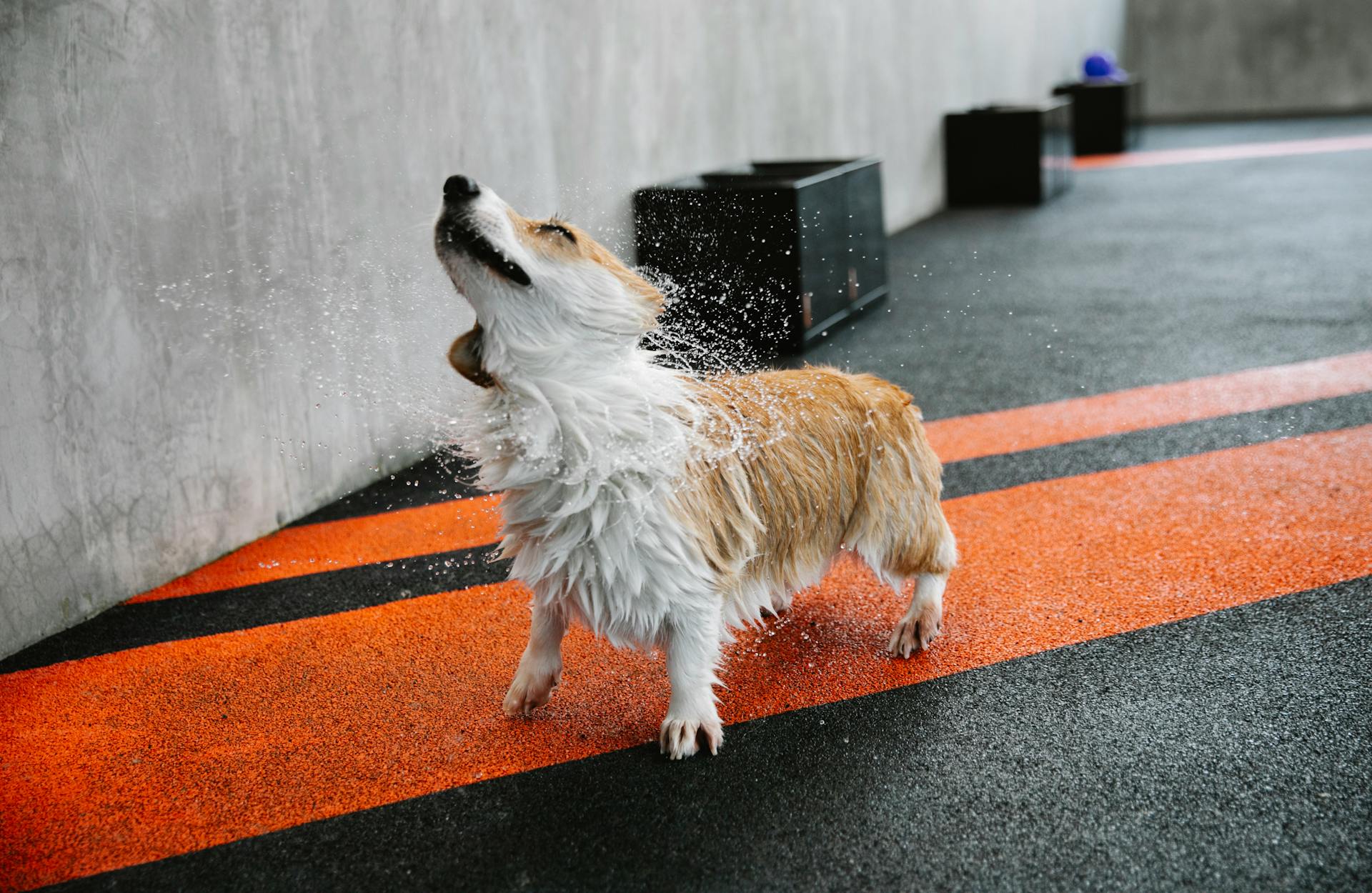
A Maltipoo's alone time needs are relatively short, lasting around 4-6 hours a day. This is because Maltipoos are highly social animals and thrive on interaction.
Their small bladder size also means they can't hold their urine for long periods. For reference, a Maltipoo's bladder can hold around 1-2 ounces of urine, which is relatively small compared to other breeds.
Maltipoos can get anxious if left alone for too long, which can lead to destructive behavior. This is because they are prone to separation anxiety, a common issue in many small dog breeds.
In general, it's best to provide Maltipoos with plenty of attention and exercise throughout the day to prevent boredom and destructive behavior.
Suggestion: Maltipoo Mixed Breeds
Understanding Separation Anxiety
Separation anxiety is a common issue in Maltipoos, and it's essential to understand the signs and symptoms to provide the best care for your furry friend. Maltipoos can develop separation anxiety due to their loyalty and social nature, leading to destructive behaviors like excessive barking, whining, and chewing.
If this caught your attention, see: Maltipoo Separation Anxiety
Leaving your Maltipoo alone for extended periods can cause them significant distress, including loneliness, boredom, stress, fear, or a combination of these emotions. This can lead to a range of behaviors, including urinating or pooping inside, and clinging to you when you return.
Some common signs of separation anxiety in Maltipoos include excessive barking, whining, and crying, as well as destructive behaviors like chewing up furniture or other inappropriate items. You may also notice that your Maltipoo is overly clingy when you return, fearing that you will leave again.
Maltipoos with severe separation anxiety may require professional help from a behaviorist to address the underlying issues. For mild cases, you can try offering your Maltipoo something to keep them busy while you're away, such as a toy stuffed with their favorite treats. This can help create positive associations around being alone.
Here are some common triggers that can exacerbate separation anxiety in Maltipoos:
- Seeing you put on your shoes and pick up your keys
- Hearing you leave the house
- Being left alone for extended periods
To help your Maltipoo manage separation anxiety, you can try desensitizing them to these triggers by gradually introducing them to the stimulus while remaining calm. For example, you can start by putting on your shoes and picking up your keys without leaving the house, then gradually increase the time you spend away from your Maltipoo.
Leaving Your Pet Alone
Leaving your Maltipoo alone can be a challenge, but with the right preparation and precautions, you can ensure their comfort and safety.
First, it's essential to understand that Maltipoos can't hold their urine for more than 4 hours, so they need to use the bathroom at least once every 4 hours. This means you'll need to make arrangements for them to do so while you're away.
You can provide mentally stimulating toys like puzzle feeders to keep your Maltipoo entertained and engaged while you're away. These toys can be a great way to distract them from your absence and reduce the effects of separation anxiety.
A crate can be a great tool for training your Maltipoo, but it's essential to start slow and limit the time they spend in it. The recommended maximum time in a crate varies by age: 30-60 minutes for 8-10 weeks, 1-3 hours for 11-14 weeks, and 3-4 hours for 15-16 weeks.
To help your Maltipoo feel safe and secure while you're away, consider crate training and providing a comfortable place for them to rest.
Here's a rough guide to the maximum time a Maltipoo can be left alone based on their age:
It's also essential to socialize your Maltipoo before leaving them alone for extended periods. This can help them feel more comfortable and secure while you're away. A short walk before you leave can also help them use the bathroom and get some exercise.
Training and Socialization
Socializing your Maltipoo before leaving the house is crucial, as this breed is very social and needs attention. Maltipoos need to learn to let you leave and come back without getting anxious.
Twenty-minute walks are ideal for Maltipoos, as they have little legs and get tired quickly. Leaving water and food accessible is also essential, as dogs always need access to water, especially when left alone for hours.
For more insights, see: How Long Can Dogs Go without Food and Water
Socializing Your Dog
Socializing your dog is essential, especially for a social breed like the Maltipoo.
This breed needs attention and interaction, so ignoring them for hours is unfair.
Twenty minutes of walking is ideal for Maltipoos, as they tire easily with their little legs.
Make sure to leave some water and food accessible for your dog when you're out.
Dogs always need access to water, so don't deny them this basic necessity.
Leaving food and water will also prevent your dog from getting anxious or stressed while you're away.
You might like: Breed Maltipoo
Train Your Pet
Training your pet requires patience and consistency. Maltipoos, in particular, need to learn to let you leave and come back without developing problematic behaviors like whining.
It's essential to provide mentally stimulating toys like puzzle feeders to keep your pet entertained and engaged. This can help reduce stress and anxiety caused by being left alone.
Exercise your pet before leaving the house to tire them out and reduce their stress levels. A tired pet is a happy pet!
Consider crate training your pet to help them feel safe while you're away. This can also help with potty training and prevent destructive behavior.
Leaving the radio on can be comforting to some pets, so it's worth trying if you think it might help. Just be sure to keep the volume at a reasonable level to avoid startling your pet.
If you have a long workday or travel frequently, consider hiring a dog walker or pet sitter to check in with your pet and take them for a stroll. Alternatively, ask a trusted neighbor to check in and take your pet for a bathroom break if needed.
Limit Leave Time to 4 Hours
Limiting leave time is crucial for your Maltipoo's well-being. You should not leave your Maltipoo alone for more than four hours at a time.
To determine the maximum leave time, consider your Maltipoo's age. For instance, an 8-10 week old puppy can only be left alone for 30-60 minutes, while an 11-14 week old puppy can be left alone for 1-3 hours. As your puppy grows, so does its bladder strength, allowing it to hold its urine for longer periods.
You might enjoy: Maltipoo Black Puppy
Here's a rough guide to the maximum leave time for your Maltipoo based on age:
Keep in mind that these are general guidelines, and you should adjust the leave time according to your Maltipoo's individual needs and habits. It's also essential to remember that puppies need to urinate frequently, so you should plan potty breaks accordingly.
Puppy Care and Considerations
Puppies can be left alone for varying amounts of time depending on their age, but it's essential to consider their needs and limitations.
Puppies under ten weeks can only be left alone for one hour, while those between ten to twelve weeks can tolerate two hours. As they grow, their time alone increases, but it's still crucial to monitor their behavior and adjust accordingly.
At three months old, puppies can typically hold their urine for one hour for every month they've lived, but this can vary greatly. It's not uncommon for adult dogs to hold it for six hours, but it's still essential to provide regular breaks and exercise.
If you work all day, it's not a reason to avoid getting a dog. With the right arrangements, such as hiring a dog sitter or enrolling your dog in doggy daycare, you can still provide a happy and healthy home for your furry friend.
However, Maltipoos, in particular, are a social breed and may require more attention and interaction. Leaving them alone for extended periods can lead to separation anxiety and loneliness.
To ensure your puppy's comfort and safety, consider the following tips:
- Provide mentally stimulating toys like puzzle feeders.
- Make sure your puppy has access to their bed, food, and clean water.
- Exercise your puppy before leaving to tire them out and reduce stress.
- Consider leaving the radio on for comfort.
- Crate train your puppy to help them feel safe.
- Hire a dog walker or pet sitter to check in and provide a break.
Remember, leaving a puppy alone for too long can result in behavioral issues, separation anxiety, and physical problems. It's essential to strike a balance between giving your puppy the freedom to be alone and providing the attention and care they need.
A fresh viewpoint: Brindle Maltipoo Puppies
Making It Easier
Tiring out your Maltipoo before leaving the house is a great idea, so take them for a walk or play a fun game in the yard to burn off energy.
Having a selection of toys is essential, especially for a playful breed like the Maltipoo.
Puzzle toys are a great way to distract your Maltipoo, and they'll love solving puzzles to receive treats.
A slow feeder puzzle game like the Outward Hound slow feeder puzzles can provide brain stimulation and distraction for your Maltipoo.
Frozen dog toy puzzles are another great option, and they'll keep your dog entertained for hours.
Stuffing a Kong with treats and freezing it in advance is a simple yet effective way to keep your Maltipoo occupied.
Socialization and attention are just as important as physical exercise and mental stimulation for Maltipoos.
Hiring a pet sitter or having a trusted person check in on your pup while you're away can be a great option for social Maltipoos.
Providing your Maltipoo with different tools and solutions, such as puzzle toys and frozen treats, can help meet their needs while you're away.
Age and Development
As your Maltipoo grows, their ability to be left alone changes significantly. At around 10 to 12 weeks, they start to gain some independence but still can't be left alone for a full day.
Puppies at this age can be left alone for no longer than two hours, and accidents are still very likely to happen. To make cleanup easier, use baby gates to keep them in a hard floor area.
As your Maltipoo reaches 3 to 6 months, you can consider the one-hour-per-month rule. For example, a 3-month-old puppy can be alone for three hours, and a 4-month-old puppy can be alone for four hours.
Related reading: Adopt a Maltipoo Puppy
8-10 Weeks
At 8 to 10 weeks, your puppy is still getting used to their new environment and needs constant attention from you. They have tiny bladders and can't hold their urine for long periods.
You should stay with them as much as possible during this time to help them feel secure and build trust. They're also more prone to accidents if left alone for too long.
Their small bladders mean they can only be left alone for about an hour at a time, so make sure to provide a safe space like a kennel or playpen with toys and comfortable bedding.
10-12 Weeks
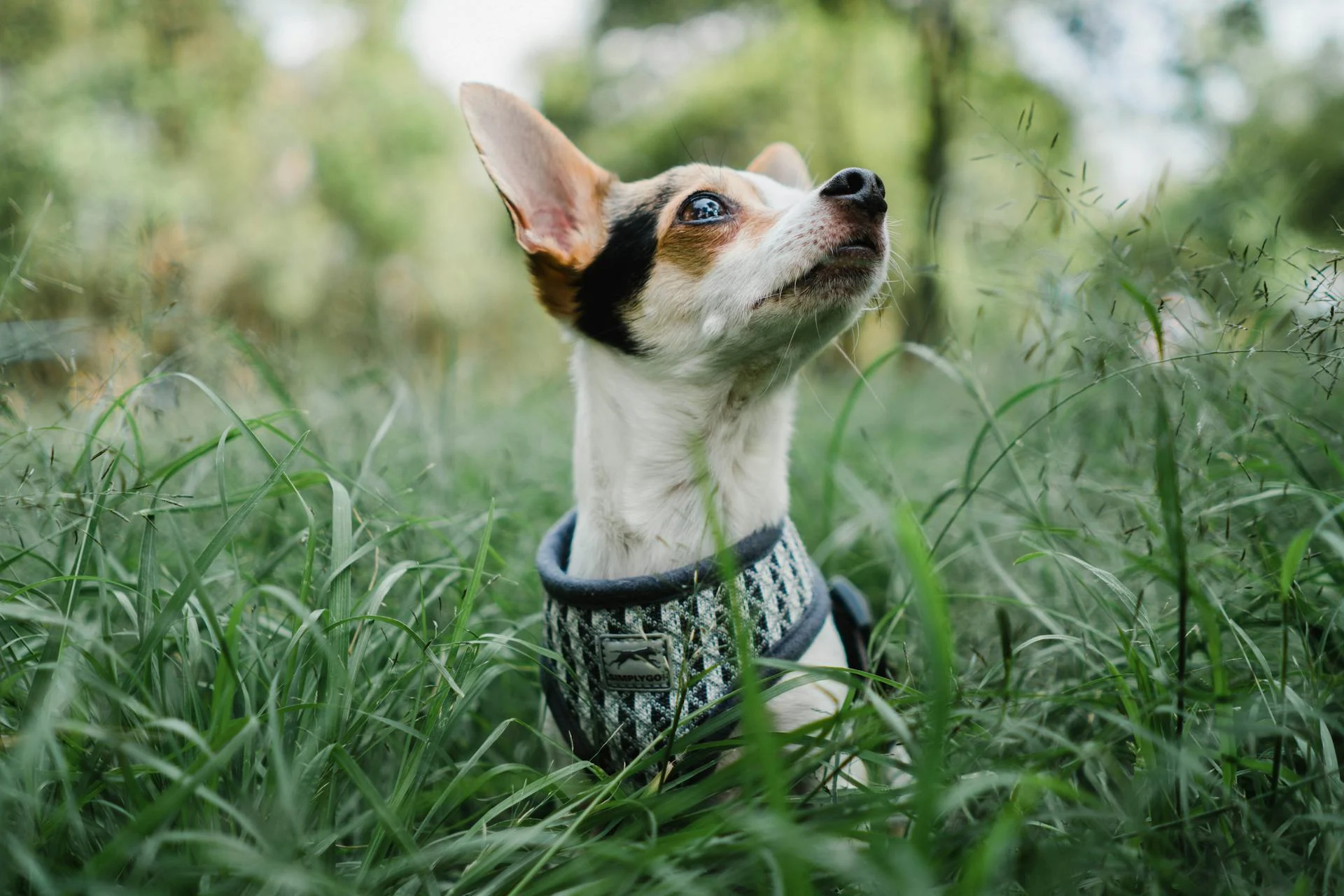
At 10 to 12 weeks, puppies start to gain some independence, but they still can't be left alone for a full day.
They are still curious and accidents are likely to happen, so it's essential to keep an eye on them.
You can use baby gates to keep them in a hard floor area, making cleanup much easier.
Puppies can be left alone for no longer than two hours at this age.
3-6 Months
At 3 to 6 months, your puppy can be alone for a few hours, with the one-hour-per-month rule in mind. Three-month-old puppies can handle three hours, while four-month-olds can manage four hours.
Bathroom issues will still occur, but less frequently. Maltipoo owners can relate to this, as their breed follows a similar rule.
You can extend the area your puppy is left in, but make sure it's safe first. It's essential to do a test run with shorter periods to ease them into the longer times.
Sources
- https://www.dogster.com/dog-health-care/can-maltipoos-be-left-alone-at-home
- https://www.hepper.com/can-maltipoos-be-left-alone/
- https://www.oodlelife.com/can-maltipoos-stay-at-home-alone/
- https://www.mydoodlepuppy.com/blog/how-long-can-maltipoos-be-left-alone
- https://shophiddin.com/blogs/news/how-long-can-a-puppy-be-left-alone
Featured Images: pexels.com
